- Home
- Anne Rivers Siddons
Sweetwater Creek Page 3
Sweetwater Creek Read online
Page 3
“It could have been, though,” she muttered stubbornly. “It could have, sometime before we had it. Daddy said it was a great rice plantation once, and then a sea island cotton plantation. He said we have the best river access on this island. You can ship anything anywhere from our landing. I bet…”
“Emily,” her aunt said more softly. “You know it was never a great plantation. You know that. Maybe it could have been once, but the people who built it managed to sink everything into rice just when cotton was coming in, and then the next crowd forgot about the old rice gates and flooded the cotton crop and left, and the next crowd—the Olivers, I think—just let it sit fallow except for a kitchen garden and a cow pasture, until Grandaddy Carter bought it in 1925. Planted it in soybeans for a cash crop and put in the barns and stables. He was going to make it into one of the great horse farms in the Lowcountry. Of course, he didn’t figure on 1929. I guess nobody down here did. It’s been the way it is now ever since, except for the dogs, of course. Why do you keep on with this great plantation business?”
Emily did turn to look at her aunt then. She smiled unwillingly in answer to Jenny Raiford’s own soft smile.
“I just want something to be special,” she said.
Jenny came to her and hugged her. Emily felt the sparrowlike ribs and the sharp shoulder blades. Unlike the other female Carters, her aunt was not round and small and vivid. She was tall, as tall as Walter Parmenter and taller than the boys, except for Buddy. Emily knew this because there was a yellowing photograph of her and her father and her aunt and all the boys in the living room, taken when Buddy could still manage to stand erect for a short time.
She had the flaming Carter hair, though, except that on her narrow head it had dulled down to a tarnished copper and was threaded with gray. She had a thin, pure face that reminded Emily of a John Singer Sargent painting, dusted with faint freckles on her nose and cheekbones. Her neck was long and her hands and feet were thin and beautiful. Her eyes were the light-spilling hazel of Emily’s own—chatoyant, Buddy had called them once. Buddy had thought Aunt Jenny was beautiful. “Elegant,” he always said.
Her aunt had been stricken mute when Buddy died, just as Emily had been.
“You’re all the special this place needs,” she said.
Emily let her face burrow into Jenny’s clean-cotton-smelling shoulder before she stepped back.
“No, I’m not,” she said. “I’m the least special thing on this whole plantation.”
Her aunt held her shoulders and looked down at her.
“Whoever on earth told you that?” she whispered.
“I don’t know. Somebody did, though,” Emily said. And this was true. The words shivered deep in her stomach sometimes, or woke her sweating from sleep. Whoever had spoken them was lost to Emily, but the words themselves were as solid and real as earth or flesh.
“Well, somebody was full of horse hockey,” Jenny said, and gave her a smart slap on the fanny before she let her go. Emily laughed, unwillingly. The whole family laughed at Aunt Jenny’s attempts to swear. She always started out fine and ended up as archaic as a Victorian boy’s novel.
Cleta came through the swinging door from the kitchen, wreathed in great, fragrant clouds of steam. Her hands were floury up to her elbows.
“Ain’t y’all done in here yet?” she said. “Everything’s ready to go in the oven but them benné seed things Mist’ Parmenter wants. Jenny, you was going to make them, remember? And did you remember to bring any sherry with you?”
“I got the only thing they had at the Bi-Lo,” Jenny said. “I don’t think it’s what Walter had in mind, but you can’t get 1949 amontillado around here, I don’t think. Okay, I’ll start the benné seed biscuits, though why on earth he wants them, I don’t know…”
Emily knew. The night before she and the boys had sat long at the supper table, while Walter, his anger at Emily past, spun his gleaming visions out into the smoky air. He did this often, and they always listened as silently and intently as they had done last night. Emily did not know what went through the dark blond heads of her twin brothers during these grandiose monologues, but her own swam with exasperation and secret laughter and sheer boredom. Walter Parmenter’s suppertime rhapsodies rarely altered, either in content or in tempo. They were the only occasions that Emily ever saw him animated and grandiose. Most of the time he was close-faced and quiet, with the look of great distances in his eyes.
He talked of the not-too-far-off days when the aristocratic buyers of his Boykins would see in Walter a kind of rustic patrician kinsman, and would be visitors in his house as often as he visited theirs. They would be an entity apart, the river plantation aristocracy that still bloomed, whole and perfect, in his mind. His sons would ride and hunt with the sons of these men, and dance with their daughters at the great hunt balls, and follow their peers into the Citadel or, perhaps, Clemson. Emily would move gracefully into some small, select girls’ school, possibly Charlotte Hall, and would come out at the Christmas season with her beautiful young friends, and marry, eventually, a young man whose family name was to be seen on street signs and public buildings and the myriad, tasteful bronze plaques on the old doors along Broad Street. He himself would sit in clubs and drawing rooms with the fathers of these gilded young, and his knowledge of hunting and hunting dogs would hold them all in thrall. His Boykins would be prized in the entire sporting world.
“Sweetwater Boykins?” sportsmen would say from Grosse Point to Sea Island. “Best hunting dogs in the world. I got mine early, before every fool with a shotgun found out about them. You’d have to go some to get one now. Parmenter’s got a waiting list for pups a mile long. And if they’ve been started and broke at Sweetwater, you’ll never want another dog again in your life. Good man, too, Parmenter. Knows what’s important. And that place of his is the best natural hunting land I’ve ever seen. Deepwater docking, open marsh and wood marsh, deep woods, and open fields for quail.”
But last night’s fugue had been rococo even for him. In the candlelight he insisted on at supper, his sharp-planed face had glowed with more than sun, and his long, slanted blue eyes shone like mica. The hectic flush was not from liquor, Emily knew; her father allowed himself one small glass of single-malt scotch each evening before dinner. He never drank less or more. It seemed to be a part of the ritual of their evening meal, like the absurd candles teetering on the scarred wooden table, and the clean shirt he insisted on for himself and the twins. Even the glass he drank from was the same each evening: a heavy, cut-crystal tumbler, the only one remaining of a set that included a large, ornate decanter. He had told them at one early supper that the glass had come from England with the first of the Carters, though no one seemed to know precisely when that was.
“Baccarat,” he had said when he told them about the tumbler and decanter. “Best crystal in the world. Only thing worthy of a fine single malt.”
Walter used the word “fine” a lot. It was a ritual, too. Walter Parmenter sometimes seemed to his daughter a restless subterranean force held together by rituals.
His euphoria last night had, for once, a tangible thread in it. He and the boys had a guest on the Thanksgiving hunt, a neighboring planter with homes in Idaho and Long Island and even Hungary, where, her father said, the hunting was the best in the world.
Townsend Chappelle had both inherited money and made it, managing the network of supermarket newspapers about this Hollywood star’s anorexia and that one’s secret marriage at thirteen to a male exotic dancer at Chippendale’s. It had been the family business for decades. By now he had an unimaginable amount of money. Hunting was his life, and he had made Spartina, his great plantation on Wadmalaw Sound, into a sportsman’s paradise. Friends came from all over the world to hunt there, among them celebrities of every persuasion, whose post-hunt antics made the rounds of Charleston, usually in whispers. An invitation to hunt at Spartina was tantamount to one to hunt at Bernard Baruch’s fabled Hobcaw Barony in its halcyon days. The mere name
Spartina shrouded the guest in privilege and singularity.
And he was joining the Parmenters on Thanksgiving morning because he wanted to see a good Boykin in action and he had heard that Sweetwater had exceptional ones. His own prize Labradors were too large for the stubby little boats that slipped into duck blinds, and his own flushing spaniels were too small to sustain long runs in extreme heat or swims in icy water. He wanted to start his own kennel of perfect waterfowl spaniels. Friends had referred him to Walter.
“Who are you taking besides Elvis, Dad?” Walt Junior said.
“No others, this time. Elvis is the best we’re ever likely to have. I’m going to let him go after a quail or two, too, and if we’re lucky he can flush a deer for us.”
“Don’t you think that’s kind of risky?” Carter said. “Elvis has never actually hunted. Maybe you ought to have some backup.”
“Don’t need it. Dog can do anything you tell him to,” their father said. “He’s done everything but go in the water after a shot game bird; he’s a beautiful sight in the water with the dummies. Sails right in like a dolphin.”
“You going to take Emily?” Walt Junior said, looking sidewise at her out of his father’s narrow blue eyes. Emily did not raise her head or speak.
“Not this time. Might put ol’ Townsend off, to have a little girl underfoot petting the dog.”
Still, Emily said nothing. Did he truly not remember who had trained at least half of last year’s Boykins?
The silence spun out awkwardly. Walter jerked around to look at her, suddenly, as if remembering she was there.
“I’ll let her come down and put a bug in Elvis’s ear before we leave,” he said jovially. “That way he’ll have it on good authority what he’s supposed to do. By the time we get back Chappelle will order every pup we’ve got coming along for the next fifty years, and let us train them, too. The whole Lowcountry will follow on his heels, just like water when you pull the stopper out.”
He looked as if he might actually levitate into the murky air of the breakfast room. Emily excused herself and got up to go to bed. She thought her heart would burst with rage and a sneaking, childish sorrow.
“Wait a minute, Emily,” her father called after her. She stopped but did not turn.
“Tell Cleta and your aunt Jenny that I want somebody to make up some of those benné seed things they have at Charleston cocktail parties, and get a good bottle of sherry in here, and polish up the library and have a fire going in there about sunset. I expect Mr. Townsend Chappelle would be glad of a drink and a bite in front of the fire while we’re finishing our business up. It’s only hospitable to offer.”
Emily nodded but did not turn, and went out of the breakfast room. Behind her, she heard one of the twins say, “Where’s the library? You mean the office? Dad, it looks like a hundred-year-old kennel in there.”
Emily heard her father’s voice in response, but she did not hear what he said. Whatever it was, it did not matter.
Her father had decreed that Elvis sleep that night in the kennels with the other dogs so that his guest would not see him coming out of the house. It was not seemly for a champion flushing spaniel to be a house pet. Emily had taken him out to the kennels and settled him into a big one, warm with deep fresh straw, and told him to be quiet for a little while. He was; he watched her anxiously from behind the cage bars when she left, but he did not fuss. When the house was finally dark and quiet she slipped down the fine old spiral staircase, flaking paint now, and out to the kennels where she released him.
“Shhh,” she whispered. He wagged his stumpy tail and padded silently beside her left heel into the house and up the stairs to her bedroom. Girl and spaniel slept that night as they always had, so deeply curled into each other that they might have been conjoined.
It was only five hours later that she woke him and took him back to the kennels. She sat down on the straw with him and put her arms around him.
“You’re going out with Daddy and a real big shot today. Daddy wants to show you off. I won’t be there, but you know how to do everything he’ll ask you.”
She stopped, seeing in her mind endless cold, dark mornings, with Elvis being loaded into the trailer and taken out to the freezing marsh to bring back to the blind the warm, now-limp ducks who wintered there. She saw him scrambling out of the water with a wood duck in his mouth, wagging his tail and taking it straight to a grinning Walter Parmenter. Emily thought wood ducks the most beautiful birds she had ever seen. Her eyes filled with tears.
“You just do what you think is right,” she said. He wagged his tail and grinned at her, his yellow eyes full of trust and love. By the time Emily was back in bed a cold red dawn was breaking over the steely river outside her window. Soon she heard the growling of a powerful engine, and her father’s jovial voice welcoming the incoming supermarket tabloid king, who replied in a clipped New England accent.
She crept to the landing window and looked out. In the chill fog off the river she saw the dim outlines of her father and two brothers standing beside a huge custom hunting vehicle shaking hands with the visitor. Her father’s voice was hearty and booming, not level and almost toneless as it usually was. She cringed in embarrassment. Her brothers faded into the fog and came back with Elvis on a chain lead. The old two-dog aluminum crate already sat in the bed of her father’s Dodge pickup. Just before one of the twins hoisted him up into the crate, Elvis looked up in Emily’s direction and wagged his tail. Emily ran back to her bed and pulled the covers over her head and wept. She did not hear the hunting party move out.
By two o’clock that afternoon most of the dinner preparations were done and the table set. Cleta shoved the enormous wild turkey that Carter had shot and dressed into the oven. The black iron pan of corn bread-and-oyster dressing was ready to be put in an hour before dinnertime. Two pecan pies sat cooling on the oilcloth-covered kitchen table.
Cleta put on her outsized down-filled jacket and prepared to go home. Emily knew that she would begin cooking for her own household when she got there. She had said there would be roughly eighteen for dinner. Cleta had kin all over the Lowcountry.
“It doesn’t seem right that you should spend practically a whole day cooking for just us when you’ve got all those folks to feed at home,” Emily had said to her once.
“Shoot, I’m glad to get home this late,” Cleta said. “Bertha and the girls will be so hungry they’ll have made up the dressin’ just so they can cook some extra and gobble it, an’ all the men will have been into the shine since noon. Nobody be ’specially hungry, and half of ’em be too drunk to care if I’m late. Works out real good.”
Now she said, “Y’all have a happy Thanksgiving. I sho’ do hope things work out for Mr. Walter.”
Her expression said that she had her doubts on this matter.
Emily and Jenny took rags and brooms and silver polish and the bulbous old Hoover and went down the hall to the small room that served as office, trophy room, refuge, and sometime puppy pen for Walter Parmenter. Emily was seldom invited into it. Walt Junior and Carter sometimes closed themselves in with their father, but usually it was Walter’s domain alone. Cleta dusted and Hoovered occasionally, but was not allowed to touch anything else.
“My God, it looks like the stock room in a feed store,” Jenny Raiford said. “If Mr. Gotrocks comes in here he’ll choke to death.”
Dust swirled in the dim light, puffed up from the wrinkled oriental throw rugs, and poured like smoke from the heavy, faded damask draperies that were pulled shut over the tall french doors onto the porch. The mahogany paneling and shelving, once thought unrivaled in quality among the river plantations, were now felted with dust. Doors, window frames, and mantel, all carved with sunbursts, fans, and Chippendale gougework, were a uniform smoky gray from years of fires in the small grate. The floor of the fireplace itself was completely buried under a sooty black and silvery gray drift of ash. The shelves were jammed with tarnished trophies and faded ribbons and photographs of gri
me-dimmed spaniels. Sacks of dog food and cedar bedding and boxes that had held whelping bitches covered most of the wide-planked cypress floor. Dusty scrapbooks were piled on the twin leather Morris chairs beside the fireplace. Walter’s desk, under the tall windows, was piled chin-high with account books, legal pads, ancient hunting magazines, and yellowing newspapers. A roll of toilet paper sat on top of the heap.
“Where should we put the silver tray of benné seed biscuits and the sherry? On his desk beside the toilet paper or over there on that fifty-pound sack of Eukanuba?” Emily said, beginning to laugh helplessly.
“I could tell him where to put it,” Jenny said, beginning to laugh too. It was impossible not to.
Two hours later the shelves were cleared out, the sack of dog food was moved to the back porch, the rugs and furniture and drapes were Hoovered, Walter’s desk was cleared and polished, the fireplace was clean, and a fire had been freshly laid and ready to light. Jenny brought in a large copper vase of bittersweet berries, and Emily was finishing up the silver frames of the photographs on the mantelpiece.
She picked up the last one, a large photo of a beautiful, unremembered Boykin, and the photo slipped out onto the floor, revealing another behind it. Emily took it over to the now-sparkling windows and stared at it. It, too, was badly yellowed, but she could make out the figure of a stocky man with ginger hair and a slender, erect blond man with a barrel trunk, short legs, a fine chest and shoulders, and a large head. He wore a V-neck sweater over a button-down white shirt and was almost movie-star handsome. Between them stood a willowy girl almost as tall as them, with long, perfectly straight auburn hair and slender, pretty legs under a miniskirt. Both men had their arms around the girl, and she was smiling with unmistakable delight. Both men were squinting solemnly into the sun.
She looked at it a long time and then turned to her aunt.

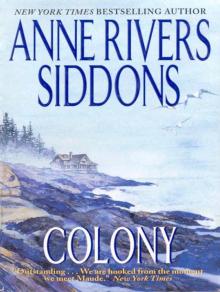 Colony
Colony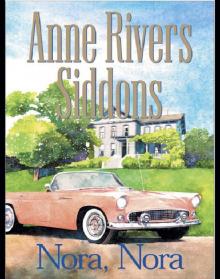 Nora, Nora
Nora, Nora House Next Door
House Next Door Homeplace
Homeplace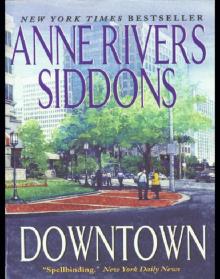 Downtown
Downtown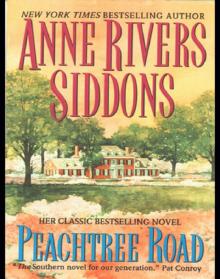 Peachtree Road
Peachtree Road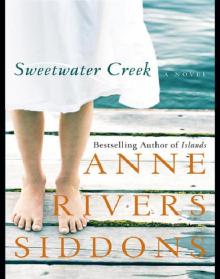 Sweetwater Creek
Sweetwater Creek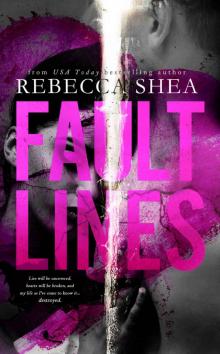 Fault Lines
Fault Lines Low Country
Low Country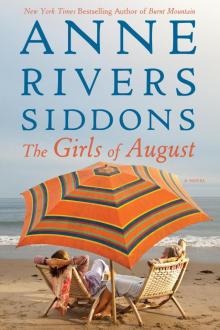 The Girls of August
The Girls of August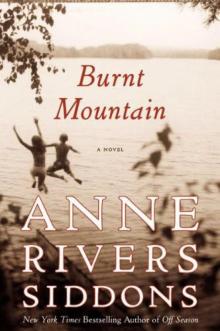 Burnt Mountain
Burnt Mountain Islands
Islands